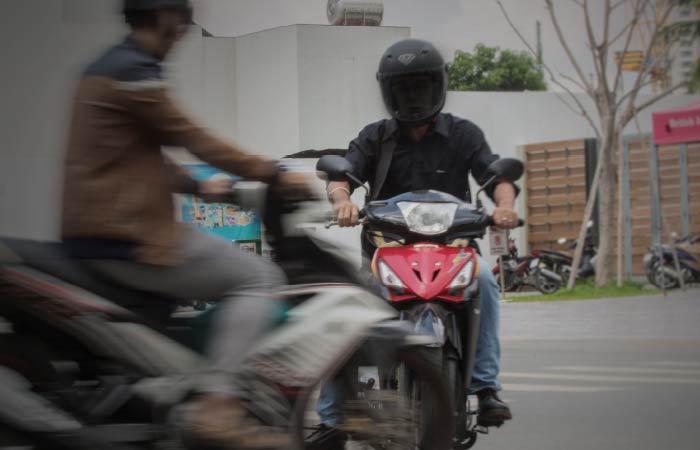What to do after an accident?

Barbara Adam and Yendy Tsang look into what to do after a traffic accident. Photo by Romain Garrigue.
Australian Sue Wise was riding home from work on a Thursday evening when she was clipped by a large box on the back of a motorbike that zoomed past her.
The next thing she knew, she was rolling along the road watching her motorbike slide ahead of her.
“Shocked and dazed, I sat on the road for a while,” Sue said. “Suddenly two guys were trying to get me up. The guy who hit me had stopped, looked at me, and left.”
Passersby helped Sue to the side of the road, where she realised she was bleeding from her mouth, she had a broken tooth and her hands and knees were badly grazed. Someone offered to give her a lift home, but Sue knew she needed medical attention.
She tried calling friends for help, but no one picked up. “I decided to go to Family Medical Practice, as it was relatively close,” she said. “The people around me hailed a taxi and started helping me get in. Then I remembered my motorbike.”
Someone told her that “a girl” would take her motorbike to the clinic but Sue only realised she didn’t have the girl’s details once the taxi had driven away.
“I arrived at Family Medical, walked inside and they put me into a wheelchair. Then a girl came in and handed me the keys to my bike and a parking card. I was taken to the examination room and I didn’t get her name.”
Sue admits she was very lucky in the aftermath of her accident, with people stopping and helping her. She never did get the name of the girl who helped or the driver who clipped her and drove off.
This story is one of the more positive accident stories you hear in Vietnam. No major injuries, and people offering to assist.
But what are you actually supposed to do when you’ve been involved in a traffic accident?
Vietnam’s National Traffic Safety Committee advises people to notify police about any accidents by calling 113. In the event of an injury, call 115. However, it’s not clear whether any emergency operators speak English.
General Medical Number
If you call 115, you should be prepared to tell the operator the number of victims, the type of injuries, your location and phone number. The operator will organise the nearest traffic police and medical facility to come and help.
The National Traffic Safety Committee recommends recording as much information as you can at the scene of the accident, including the name, phone number and address of everyone involved, and any witnesses. Take photos of the scene, and any damage to the vehicles.
It’s probably also worth taking a photo of the license plates of all vehicles involved, even though not every vehicle sale is registered with authorities, so you may only be able to track the original buyer.
If the police arrive, they should give you an accident information statement, which you can use to claim insurance.
So that’s the official advice, but the reality may be very different. In a lot of cases, the driver who caused the accident won’t stop, especially if a foreigner is involved, because they fear they’ll be required to pay for expensive medical treatment.
Public ambulances can also be quite slow, and the emergency team may not speak English. Many locals opt to take a taxi to a medical clinic rather than rely on the public ambulance.
Private Ambulance Service
Family Medical Practice also has an ambulance service, which can be summoned by calling *9999.
You can call the number for free advice on how to handle your medical emergency, or you can call for an ambulance.
A one-year subscription to the FMP ambulance service is VND575,000 per person a year. Non-subscribers can also get an ambulance service, but the fee ranges from $80 to $225. The ambulance will take you to the most reasonable hospital and clinic for your situation.
 We use cookies on this website to enhance your user experience
We use cookies on this website to enhance your user experience